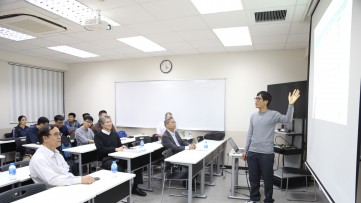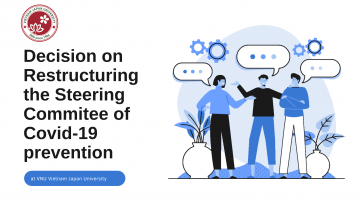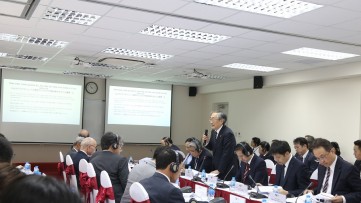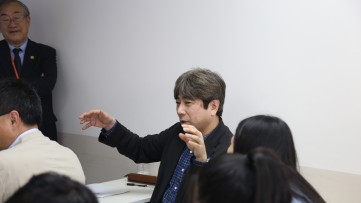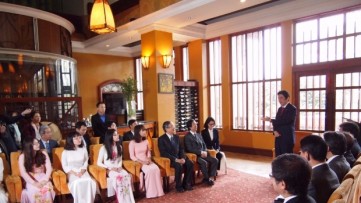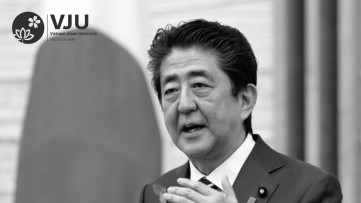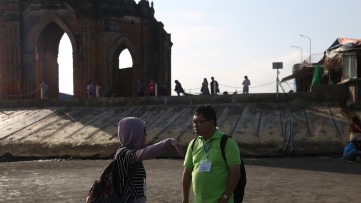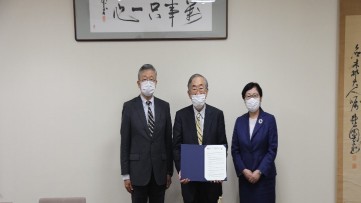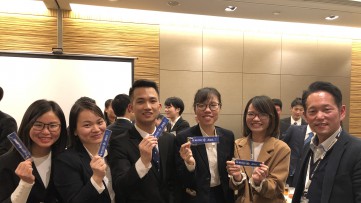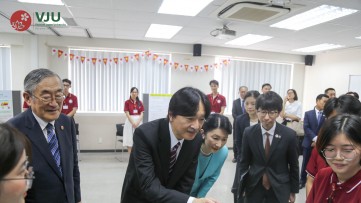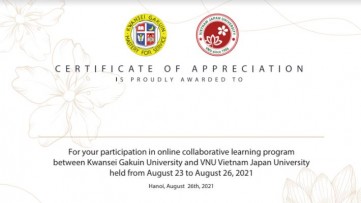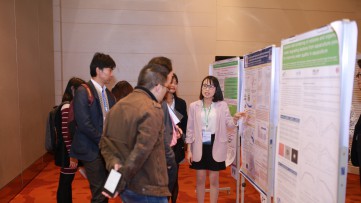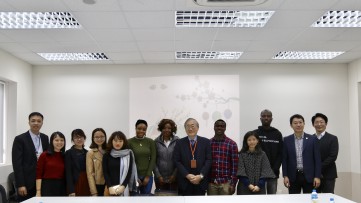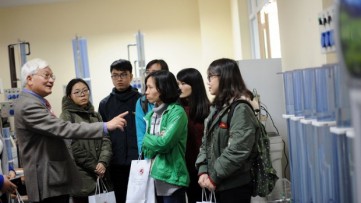ENGINEER'S PROGRAM IN CIVIL ENGINEERING
Introduction
- Name of training industry:
- Enghish: Civil Engineering
- Vietnamese: Kỹ thuật xây dựng
- Code of training industry: 7580201
- Degree: Engineer
- Graduation diploma name:
- English: The Degree of Engineer in Civil Engineering (Honors Program)
- Vietnamese: Kỹ sư Kỹ thuật xây dựng (chương trình chất lượng cao)
- Time of educate: 4 – 5 years

Civil Engineering is the third training program selected by Vietnam Japan University to open a university system after considering ways to promote the university’s strengths and dedication to the higher education field of Vietnam and contribute to the development of multi-faceted cooperation between Vietnam and Japan in the new era.
Therefore, unlike the training programs in the field of Construction Engineering, the training program in Construction Engineering of Vietnam Japan University has been built on an interdisciplinary basis between the majors of Construction Project Management, Civil and industrial construction, and Urban and traffic works. Along with that is the combination of general and necessary knowledge for the 21st century aiming to train human resources for domestic and foreign construction with high qualifications and competitiveness in the market of domestic workers, Japan and other countries in the world in the period of industrial revolution 4.0 and society 5.0.
Career opportunity
Graduates can take up the following positions:
- Civil engineer.
- Technical staff, construction staff, construction supervisors and project managers in domestic and foreign organizations and enterprises in the field of construction engineering.
- Appraisers, inspectors, managers in state agencies, enterprises and organizations in the field of construction engineering and infrastructure engineering in the provinces as well as at international organizations.
- Expert in consulting, supervising, inspecting and examining infrastructure engineering projects; formulation of investment projects, planning, design, construction and operation management of construction works.
- Teaching and research staff in the field of construction and infrastructure engineering in the domestic and international environment.
Superiority of the program
1. Liberal Arts education
- Provides a broad base of knowledge, covering both the social and natural sciences.
- Provide in-depth knowledge of Civil Engineering.
2. Applicability
Providing students with the ability to develop and create research ideas in interdisciplinary fields and develop construction technologies in the era of the Industrial Revolution 4.0.
3. Opportunity to study in Japan right in Vietnam
- In addition to Vietnamese lecturers, the Program has the cooperation of lecturers from 13 major Japanese universities.
- Students will be able to participate in many activities to exchange with Japanese students.
4. Focus on fostering foreign language ability
- The training program is designed with many modules taught in English, so the student after graduation will have an English level equivalent to B2, level 4 in the 6-step scale of Vietnam Foreign Language Competency Framework. In addition, students can learn basic Japanese and can register for advanced Japanese lessons according to their needs.
- International academic environment with the participation of many international lecturers.
5. Modern learning method
- Many modules in the training program use active learning method (active learning).
- Based on the experience of Japanese universities, the program will introduce seminar format into some modules to develop communication, discussion, teamwork skills and enhance interaction between lecturers and students, between students and students.
6. High practicality
- The content of the modules is highly practical, with the participation in teaching of many experienced experts from Japanese and Vietnamese organizations and businesses.
- Students will have the opportunity to interact with organizations and businesses through Internship programs.
Program and Learning pathway
1. Training program
The training program consists of 162 credits, which includes the following blocks of knowledge:
- General knowledge block: 21 credits
- Knowledge blocks by field: 22 credits
- Knowledge blocks by industry: 21 credits
- Knowledge by industry group: 31 credits
- Industry knowledge block: 67 credits
2. Learning pathway
The learning pathway is divided into 2 main phases:
- In the first of 2 years, students will gain knowledge of liberal arts education, general education, foreign language knowledge and modules that provide knowledge about current global issues of concern, knowledge foundation of construction engineering in mathematics, physics and construction technology.
- Two years later, students will learn the basic modules of Civil Engineering, then can choose specialized in-depth of directions in Construction Project Management, Civil and Industrial Construction, Traffic and Urban Construction or in-depth orientation guided by lecturers, the orientations are given on the basis of the current needs survey results of Vietnam and are also the orientations that can promote the strengths of the Vietnam University Japan.
Lecturers
The lecturers of the training program for Civil Engineering includes lecturers from Vietnam Japan University, long-term dispatched lecturers from partner universities, research institutes and Japanese enterprises, inside and outside Vietnam National University, Hanoi, research institutes and enterprises in Vietnam. This is a force of highly qualified, integrated, multidisciplinary and experienced staff, ensuring the operation of training programs according to the philosophy of liberal arts education for sustainable development.
The University of Tokyo is the main partner of the training program, represented by Prof. Dr. Hironori Kato, Program Co-Director.
Scholarship information
At least 20% of the students receive full or partial scholarships;
There are also business-sponsored scholarships for Hanoi National University.
Details of scholarships are available here.
Program Curriculum
The program curriculum is available here.
Admissions
Admissions Targets: 75 students/course
Admission method:
- Admission is based on the results of the assessment of qualifications (including academic records, achievements in high school.., interviews).
- Admission in another way:
– Admission is based on High School Exam Result in year.
– Admission of international foreign language certificates (English, combined with 02 subjects of high school graduation exam in year).
– Admission of results on the SAT.
– Admission of A-Level Certificate.
– Direct admission and admission to specialized high schools.
– Direct selection of candidates to participate in international competition teams or win national prizes.
– Admission is based on the results of the competency assessment exam of VNU.
Learning outcome
1. Knowledge and Expertise
1.1. General knowledge
- PLO 1: Apply general knowledge and theories in philosophy, economocs, ideology of the Communist Party, as well as basic knowledge of social sciences and law, to real-life contexts, learning, research, and work.
1.2. Knowledge by field
- PLO 2: Apply foundational knowledge of natural sciences and related applications in construction, transportation, and project management.
1.3. General knowledge of the related sciences
- PLO 3: Utilize basic knowledge in continuum mechanics, calculus, algebra, and other mathematical tools to formulate and solve engineering problems.
- PLO 4: Apply basic IT knowledge (e.g., operating systems, office software, internet…) in designing, constructing, and managing construction projects.
1.4. Fundamental knowledge of the major
- PLO 5: Apply basic knowledge of theoretical mechanics, deformable solid mechanics, material strength, structural mechanics, hydraulics, and finite element methods in civil engineering.
- PLO 6: Analyze and develop construction drawings based on knowledge of technical drawing, architectural structures, construction materials, electrical systems, and water supply and drainage systems.
1.5. Specialized knowledge of the major
- PLO 7: Design and organize construction projects using knowledge of foundations, hydrology, steel structures, concrete structures, surveying, engineering geology, and construction informatics.
- PLO 8: Explain the principles and applications of modern technologies in construction (e.g., artificial intelligence, BIM, renewable energy sources, advanced materials, geomancy).
2. Skills
- PLO 9: Analyze and calculate structural designs using academic and industry-standard references.
- PLO 10: Utilize specialized design software (e.g., AutoCAD, StaadPro, SAP2000) for construction projects.
- PLO 11: Extract quantities from design and construction drawings.
- PLO 12: Achieve a foreign language proficiency equivalent to Level 3 (Vietnam’s 6-level Foreign Language Framework).
- PLO 13: Apply communication skills to convey problems and solutions effectively in workplaces, discussions, teamwork, and capstone projects.
3. Autonomy and responsibility
- PLO 14: Demonstrate independent and teamwork abilities under changing work conditions, taking personal and group responsibility.
Contact info
Add: 5th Floor, My Dinh Campus, Luu Huu Phuoc Street, Cau Dien Ward, Nam Tu Liem District, Ha Noi, Viet Nam.
Phone: (+84) 24 73066001 – Ext 5093
Hotline: (+84) 966 954 736 (Zalo) – (+84) 96 96 38 426
Email: admission@vju.ac.vn
Academic Activities
